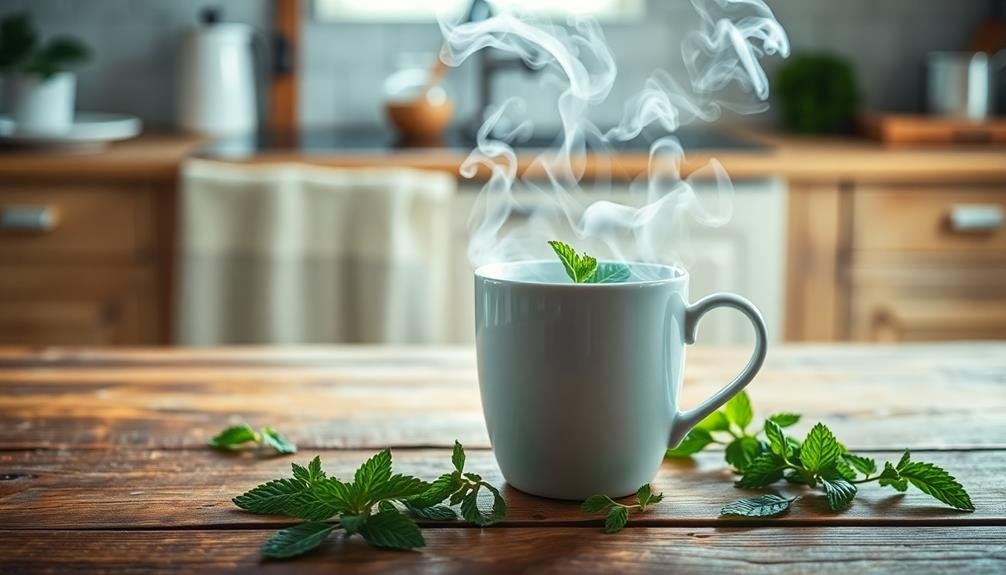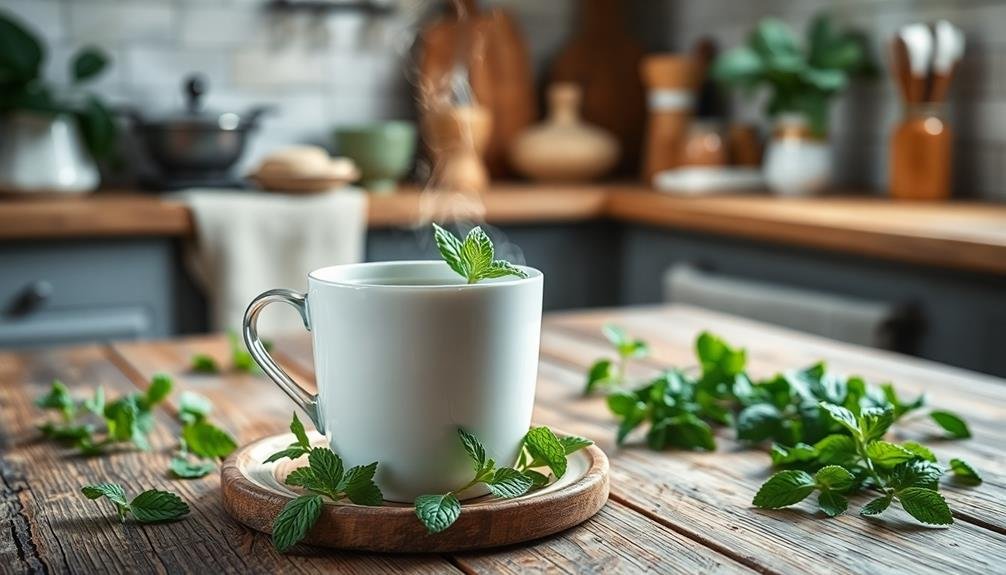Peppermint tea soothes your stomach naturally thanks to its active compound, menthol. This powerful ingredient relaxes the smooth muscles in your digestive tract, easing cramps, bloating, and discomfort. It's particularly effective for conditions like irritable bowel syndrome (IBS) and indigestion. Peppermint also stimulates bile production, enhancing nutrient absorption and improving overall digestion. Its antimicrobial properties combat harmful gut bacteria, while its aromatic compounds can help reduce nausea and vomiting. Whether you're dealing with everyday digestive issues or chronic conditions, a cup of peppermint tea can provide quick, natural relief. Discover how this simple brew can transform your digestive health and comfort.
The Science Behind Peppermint's Power

Through centuries of use and modern scientific research, peppermint has emerged as a powerful natural remedy for digestive issues. The secret behind peppermint's effectiveness lies in its active compound, menthol. When you consume peppermint tea, menthol interacts with your digestive system in several beneficial ways.
Firstly, menthol relaxes the smooth muscles in your gastrointestinal tract. This action helps alleviate spasms and cramps, reducing discomfort associated with conditions like irritable bowel syndrome (IBS).
Additionally, peppermint stimulates the production of bile, which aids in the breakdown of fats and promotes better digestion.
Peppermint also possesses antimicrobial properties, helping to combat harmful bacteria in your gut that may cause bloating or indigestion. It's been shown to reduce symptoms of nausea and vomiting, making it an excellent choice for those experiencing motion sickness or pregnancy-related queasiness.
Furthermore, peppermint tea can help relieve gas and bloating by encouraging the expulsion of trapped air in your digestive system. Its carminative properties make it an effective remedy for flatulence and abdominal discomfort.
Calming Digestive Muscles
Peppermint tea's soothing effects extend to your digestive muscles, helping to relax your gastrointestinal tract.
This relaxation can reduce muscle spasms, easing discomfort and bloating.
Relaxes Gastrointestinal Tract
For those experiencing digestive discomfort, peppermint tea offers a natural solution by relaxing the gastrointestinal tract. This soothing effect extends beyond just calming digestive muscles, as it works to relax the entire gastrointestinal system. When you consume peppermint tea, its active compounds interact with your body to promote overall digestive ease.
The relaxation of your gastrointestinal tract through peppermint tea consumption can lead to several benefits:
- Reduced bloating and gas
- Alleviation of stomach cramps
- Improved digestion and nutrient absorption
- Decreased nausea and vomiting
Peppermint tea's ability to relax the gastrointestinal tract is primarily due to its high menthol content. This compound acts as an antispasmodic, helping to ease tension in the smooth muscles lining your digestive system.
By relaxing these muscles, peppermint tea allows for smoother passage of food and waste through your intestines, reducing discomfort and promoting regularity.
If you're dealing with irritable bowel syndrome (IBS) or other digestive issues, you'll find that regularly drinking peppermint tea can provide significant relief. It's a simple, natural remedy that can make a big difference in your digestive health and overall well-being.
Reduces Muscle Spasms
Easing discomfort and promoting digestive health, peppermint tea effectively reduces muscle spasms in the gastrointestinal tract. This soothing effect is due to the presence of menthol, a compound that acts as an antispasmodic agent. When you drink peppermint tea, it helps relax the smooth muscles in your digestive system, alleviating cramps and spasms that can cause pain and discomfort.
The tea's muscle-relaxing properties extend beyond just the stomach. It can also calm the esophagus and intestines, potentially reducing symptoms of conditions like irritable bowel syndrome (IBS) and acid reflux. By decreasing muscle contractions, peppermint tea aids in smoother digestion and can help prevent bloating and gas.
You'll find that drinking peppermint tea after meals can be particularly beneficial. It helps your body process food more efficiently by reducing involuntary muscle movements that might otherwise slow digestion.
This calming effect on your digestive muscles can lead to better overall gut health and improved comfort throughout your digestive process. Remember, while peppermint tea is generally safe, it's best to consult your healthcare provider if you have chronic digestive issues.
Promotes Smooth Digestion
A gentle breeze through your digestive system is what peppermint tea offers, promoting smooth digestion by calming your digestive muscles. This soothing effect helps alleviate common digestive discomforts and encourages a more efficient digestive process.
When you drink peppermint tea, you're harnessing its natural ability to relax the gastrointestinal tract, which can lead to better nutrient absorption and less bloating.
The tea's active compounds, particularly menthol, work to:
- Relax the smooth muscles of the digestive tract
- Reduce gas and bloating
- Ease stomach cramps and spasms
- Stimulate bile flow for improved fat digestion
Easing Bloating and Gas

Peppermint tea can help ease your bloating and gas by relaxing your digestive muscles.
It's known to reduce intestinal inflammation, which often contributes to these uncomfortable symptoms.
Relaxes Digestive Muscles
One of peppermint tea's most notable benefits is its ability to relax digestive muscles. When you drink peppermint tea, it helps ease tension in your gastrointestinal tract, which can alleviate discomfort and promote smoother digestion. The menthol in peppermint acts as an antispasmodic, reducing muscle contractions and allowing food to pass through your system more easily.
This relaxation effect can be particularly helpful if you're experiencing:
- Irritable bowel syndrome (IBS)
- Stomach cramps
- Indigestion
- Nausea
By sipping on peppermint tea, you're providing your digestive system with a natural, gentle remedy that can help soothe various stomach issues.
The tea's muscle-relaxing properties can also aid in reducing stomach acid production, which may help alleviate symptoms of acid reflux or heartburn.
Reduces Intestinal Inflammation
How does peppermint tea tackle intestinal inflammation? It works by targeting the root causes of digestive discomfort. Peppermint contains menthol, a powerful compound that reduces inflammation in your intestinal lining. When you drink peppermint tea, this natural anti-inflammatory agent goes to work, soothing irritated tissues and calming your digestive system.
The tea's effects extend beyond just reducing inflammation. It also helps ease bloating and gas, two common symptoms of intestinal distress. Peppermint tea relaxes the smooth muscles in your digestive tract, allowing trapped gas to pass more easily. This action helps deflate bloating and relieves the uncomfortable pressure you might feel after meals.
You'll find that peppermint tea can be particularly effective if you suffer from conditions like irritable bowel syndrome (IBS). Its anti-spasmodic properties help regulate bowel movements and reduce abdominal pain.
Promotes Healthy Digestion
Beyond its anti-inflammatory benefits, peppermint tea plays a key role in promoting healthy digestion.
It's especially effective in easing bloating and gas, two common digestive discomforts. When you drink peppermint tea, you're harnessing its natural carminative properties, which help reduce intestinal gas and relieve associated pain.
Peppermint tea works by relaxing your digestive system's muscles, allowing trapped gas to pass more easily. This action helps alleviate bloating and the uncomfortable feeling of fullness. Additionally, it can stimulate the production of digestive enzymes, further aiding in the breakdown of food.
To maximize the digestive benefits of peppermint tea, consider these tips:
- Drink a cup 20-30 minutes before meals to prepare your digestive system
- Sip slowly after meals to aid in digestion and reduce bloating
- Opt for loose leaf peppermint tea for stronger effects
- Avoid adding sugar, which can counteract some of the tea's benefits
Reducing Nausea and Vomiting
Peppermint tea offers two key benefits for those struggling with nausea and vomiting. First, it helps relax your stomach muscles, which can reduce the urge to vomit. Second, its menthol content acts as a natural anesthetic, numbing your stomach lining and easing discomfort.
When you're feeling nauseous, sipping on warm peppermint tea can provide quick relief. The tea's aromatic compounds work through your olfactory system to calm your stomach and reduce queasiness. It's particularly effective for motion sickness and pregnancy-related nausea.
To maximize the benefits, steep your peppermint tea for 5-7 minutes. This allows enough time for the essential oils to be released into the water. You can drink it hot or let it cool slightly if you're sensitive to heat when nauseous.
While peppermint tea is generally safe, it's best to consult your doctor if you're pregnant or have chronic conditions like GERD. For most people, however, it's a gentle, natural remedy that you can rely on whenever nausea strikes.
Keep some peppermint tea bags on hand for those unexpected bouts of queasiness.
Alleviating Irritable Bowel Syndrome Symptoms

If you're struggling with Irritable Bowel Syndrome (IBS), peppermint tea can offer significant relief.
You'll find that it reduces abdominal pain and calms digestive spasms, two common and uncomfortable symptoms of IBS.
Additionally, the soothing properties of peppermint tea can ease the bloating discomfort often associated with this condition.
Reduces Abdominal Pain
For those suffering from Irritable Bowel Syndrome (IBS), peppermint tea can be a game-changer in reducing abdominal pain. The natural compounds in peppermint, particularly menthol, work to relax your intestinal muscles and ease the discomfort associated with IBS.
By sipping on this soothing beverage, you're providing your digestive system with a gentle, natural remedy that can help alleviate cramping and bloating.
To maximize the benefits of peppermint tea for abdominal pain relief, consider these tips:
- Drink it warm, not hot, to avoid irritating your stomach lining
- Consume 1-2 cups daily, especially after meals
- Steep the tea for 5-10 minutes to extract the most beneficial compounds
- Choose organic, caffeine-free peppermint tea for the best results
While peppermint tea isn't a cure-all for IBS, it can considerably reduce the intensity and frequency of abdominal pain episodes.
The anti-spasmodic properties of peppermint help to calm intestinal contractions, potentially decreasing the severity of IBS symptoms.
If you're looking for a natural way to manage your abdominal discomfort, incorporating peppermint tea into your daily routine could be a simple yet effective solution.
Calms Digestive Spasms
Relief from digestive spasms is another significant benefit of peppermint tea, particularly for those struggling with Irritable Bowel Syndrome (IBS). Peppermint's natural antispasmodic properties help relax the smooth muscles in your digestive tract, easing painful contractions and reducing bloating.
When you drink peppermint tea, you're ingesting menthol, a compound that blocks calcium channels in the intestinal muscles. This action helps prevent spasms and promotes smoother digestion. For IBS sufferers, this can mean fewer episodes of abdominal pain and discomfort.
Here's a breakdown of how peppermint tea affects digestive spasms:
| Symptom | Peppermint's Action | Benefit |
|---|---|---|
| Muscle Contractions | Relaxes smooth muscles | Reduced cramping |
| Bloating | Decreases gas buildup | Less abdominal distension |
| Pain | Blocks pain receptors | Diminished discomfort |
| Motility | Regulates intestinal movement | Improved digestion |
| Inflammation | Anti-inflammatory effects | Decreased irritation |
While peppermint tea can be a helpful natural remedy for digestive spasms, it's important to consult with your healthcare provider if you're experiencing chronic symptoms. They can help determine the underlying cause and recommend appropriate treatment options.
Eases Bloating Discomfort
Beyond its ability to calm digestive spasms, peppermint tea shines in easing bloating discomfort, particularly for those with Irritable Bowel Syndrome (IBS). The menthol in peppermint acts as an antispasmodic, relaxing the muscles of your digestive tract and reducing the painful bloating associated with IBS.
When you're feeling bloated, a warm cup of peppermint tea can provide quick relief.
To maximize the benefits of peppermint tea for bloating:
- Steep the tea for 5-10 minutes to guarantee you're extracting all the beneficial compounds
- Drink it 30 minutes before meals to prepare your digestive system
- Opt for loose leaf tea or high-quality tea bags for the best results
- Consider adding a slice of fresh ginger for enhanced digestive benefits
Regular consumption of peppermint tea can help manage IBS symptoms long-term. It's not just about immediate relief; you're also supporting your overall gut health.
If you're dealing with chronic bloating or IBS, incorporating peppermint tea into your daily routine can be a simple yet effective strategy. However, it's important to consult with your healthcare provider if symptoms persist or worsen.
Freshening Breath Naturally
Peppermint's breath-freshening power makes it a natural choice for those seeking to combat bad breath. When you drink peppermint tea, you're not just enjoying a soothing beverage; you're also giving your mouth a revitalizing cleanse. The menthol in peppermint helps neutralize odor-causing bacteria, leaving your breath smelling clean and minty.
Unlike artificial breath fresheners, peppermint tea doesn't just mask bad odors—it addresses the root cause. The antibacterial properties of peppermint can help reduce the number of harmful bacteria in your mouth, which are often responsible for unpleasant breath.
Additionally, the tea stimulates saliva production, which naturally helps cleanse your mouth and wash away food particles that can lead to bad breath.
You'll find that drinking peppermint tea regularly can provide long-lasting freshness. It's a simple, natural way to maintain oral hygiene between brushings. Plus, you're avoiding the artificial sweeteners and chemicals found in many commercial breath fresheners.
For best results, try sipping peppermint tea after meals or whenever you need a quick breath boost. It's an effective, pleasant way to keep your breath fresh throughout the day.
Boosting Overall Digestive Health

While freshening breath is a notable benefit, peppermint tea's digestive prowess extends far beyond your mouth. This soothing beverage can considerably boost your overall digestive health, offering relief from various gastrointestinal issues.
When you sip on peppermint tea, you're harnessing the power of menthol, its primary active compound, which works wonders for your digestive system.
Peppermint tea can help:
- Reduce bloating and gas by relaxing the muscles in your digestive tract
- Alleviate symptoms of irritable bowel syndrome (IBS) by calming intestinal spasms
- Ease nausea and vomiting, making it an excellent natural remedy for motion sickness or pregnancy-related queasiness
- Stimulate bile production, which aids in the breakdown of fats and promotes better digestion
Antispasmodic Properties of Peppermint
The muscle-relaxing power of peppermint tea extends to its remarkable antispasmodic properties. When you sip this soothing brew, you're harnessing nature's ability to calm muscle spasms in your digestive tract. Peppermint contains menthol, a compound that effectively relaxes the smooth muscles lining your intestines. This action helps alleviate cramps, bloating, and discomfort associated with various digestive issues.
You'll find that peppermint tea's antispasmodic effects can provide relief from conditions like irritable bowel syndrome (IBS) and indigestion. It works by reducing the intensity and frequency of muscle contractions in your gut, allowing for smoother digestion and less pain.
The tea's ability to relax the lower esophageal sphincter can also help ease symptoms of acid reflux.
For maximum benefit, drink peppermint tea between meals or after eating. You'll likely notice a reduction in abdominal pain and bloating within 15-30 minutes of consumption.
While it's generally safe for most people, those with severe acid reflux or hiatal hernias should consult their doctor before regular use. Incorporating peppermint tea into your routine can be an effective, natural way to manage digestive discomfort and promote overall gastrointestinal health.
Soothing Stomach Cramps

One of the most notable benefits of peppermint tea is its ability to soothe stomach cramps. When you're experiencing discomfort in your digestive system, this aromatic beverage can provide quick relief. Peppermint's natural compounds work to relax the smooth muscles in your gastrointestinal tract, easing tension and reducing pain.
To make the most of peppermint tea's stomach-soothing properties, follow these steps:
- Brew a strong cup of peppermint tea using fresh or dried leaves
- Sip it slowly, allowing the warm liquid to coat your stomach
- Take deep breaths to inhale the tea's soothing aroma
- Repeat the process 2-3 times daily for maximum benefit
The menthol in peppermint tea acts as a natural analgesic, numbing pain receptors in your stomach lining. This effect can considerably reduce the intensity of cramps, making them more manageable.
Additionally, peppermint tea's anti-inflammatory properties help calm irritated stomach tissues, further alleviating discomfort. By promoting healthy digestion and reducing bloating, this herbal remedy addresses multiple factors contributing to stomach cramps.
You'll likely notice relief within 15-30 minutes of drinking peppermint tea, making it a quick and effective solution for digestive distress.
Enhancing Nutrient Absorption
Peppermint tea's benefits extend beyond soothing stomach cramps. It can also enhance your body's ability to absorb nutrients from the food you eat. This is particularly important if you're dealing with digestive issues that may be hindering proper nutrient absorption.
The menthol in peppermint tea stimulates the production of bile, a substance that aids in the breakdown and absorption of fats. By increasing bile flow, you're better able to digest and absorb fat-soluble vitamins like A, D, E, and K.
Additionally, peppermint tea can help relax the muscles of your digestive tract, allowing for smoother passage of food and potentially increasing the surface area available for nutrient absorption.
Peppermint tea's anti-inflammatory properties may also contribute to improved nutrient absorption. By reducing inflammation in your digestive system, it can help heal the intestinal lining, which is vital for proper nutrient uptake.
Moreover, the tea's ability to reduce bloating and gas can lead to a more efficient digestive process overall, ensuring that you're getting the most out of your meals. Remember, better nutrient absorption means your body can more effectively use the vitamins and minerals you consume.
Combating Indigestion and Heartburn

Indigestion and heartburn can be uncomfortable and disruptive to your daily life, but peppermint tea offers a natural remedy. When you're experiencing these digestive issues, reaching for a cup of peppermint tea can provide quick relief. The menthol in peppermint helps relax the smooth muscles of your digestive tract, easing discomfort and promoting better digestion.
To combat indigestion and heartburn with peppermint tea:
- Brew a cup of peppermint tea using loose leaves or tea bags.
- Sip it slowly, allowing the soothing properties to take effect.
- Drink it 15-20 minutes before meals to prevent indigestion.
- For heartburn relief, enjoy a cup after meals.
Peppermint tea works by reducing stomach acid and decreasing the likelihood of acid reflux. It also helps alleviate bloating and gas, common symptoms of indigestion.
While it's effective for many people, those with severe gastroesophageal reflux disease (GERD) should consult their doctor before regularly consuming peppermint tea, as it may worsen symptoms in some cases.
For most individuals, however, peppermint tea serves as a safe, natural, and pleasant way to combat indigestion and heartburn, promoting overall digestive comfort.
Peppermint Tea vs. Other Remedies
While peppermint tea offers numerous benefits for digestive health, it's natural to wonder how it stacks up against other remedies. Unlike over-the-counter medications, peppermint tea is a natural solution with fewer side effects. It's gentler on your system and can be consumed more frequently without concerns about long-term use.
Compared to other herbal teas, peppermint stands out for its potent menthol content, which is particularly effective in soothing stomach discomfort. However, it's essential to recognize that some conditions may benefit more from other remedies. Here's a quick comparison:
| Remedy | Pros | Cons |
|---|---|---|
| Peppermint Tea | Natural, cheap, widely available | May worsen acid reflux |
| Ginger Tea | Anti-inflammatory, helps nausea | Strong taste, may cause heartburn |
| Antacids | Fast-acting, neutralizes stomach acid | Temporary relief, potential side effects |
While peppermint tea is an excellent choice for general digestive discomfort, it's not a one-size-fits-all solution. You should consider your specific symptoms and consult with a healthcare professional if you have persistent or severe digestive issues. Remember, what works best for you may depend on your individual needs and sensitivities.
Brewing the Perfect Cup

How can you guarantee you're getting the most out of your peppermint tea? The key lies in proper brewing techniques.
Start with fresh, high-quality peppermint leaves or tea bags. If using loose leaves, measure about one teaspoon per cup of water. For ideal flavor and medicinal benefits, use water that's just below boiling point, around 200°F (93°C).
Steep your peppermint tea for 5-7 minutes, allowing the leaves to fully release their essential oils and flavors. Longer steeping times can result in a stronger, more potent brew, but be careful not to oversteep, as this can lead to bitterness.
Once brewed, remove the leaves or tea bag and enjoy your soothing cup of peppermint tea.
To enhance your peppermint tea experience, try these tips:
- Add a slice of lemon for a citrusy twist
- Sweeten with a touch of honey for added throat-soothing benefits
- Chill your brewed tea for a revitalizing iced version
- Blend with other herbs like chamomile or ginger for complementary flavors and benefits
Frequently Asked Questions
Can Pregnant Women Safely Drink Peppermint Tea?
You can generally drink peppermint tea while pregnant, but it's best to consume it in moderation. If you're experiencing heartburn or have concerns, it's wise to consult your healthcare provider before adding it to your diet.
Does Peppermint Tea Contain Caffeine?
You'll be glad to know that peppermint tea is naturally caffeine-free. Unlike black or green tea, it's made from peppermint leaves, not tea leaves. You can enjoy it any time without worrying about caffeine's effects.
How Many Cups of Peppermint Tea Can I Drink Daily?
You can safely drink 3-4 cups of peppermint tea daily. It's generally well-tolerated, but don't overdo it. If you're pregnant or have certain health conditions, consult your doctor first. Listen to your body and adjust accordingly.
Can Children Drink Peppermint Tea for Stomach Issues?
You can give children peppermint tea for stomach issues, but use caution. It's generally safe in small amounts for kids over 2. Always consult your pediatrician first, especially for younger children or those with specific health conditions.
Are There Any Side Effects of Drinking Too Much Peppermint Tea?
Yes, if you drink too much peppermint tea, you might experience side effects. You could have heartburn, nausea, or headaches. It may also interfere with certain medications. Moderation is key to enjoying its benefits safely.
In Summary
You've discovered the natural power of peppermint tea for soothing your stomach. Whether you're dealing with indigestion, bloating, or IBS symptoms, this aromatic brew can offer relief. It's easy to prepare and gentler than many over-the-counter remedies. Remember, while peppermint tea is generally safe, it's always wise to consult your doctor if you have persistent digestive issues. So go ahead, brew a cup, and let nature's remedy work its magic on your tummy troubles.





Leave a Reply